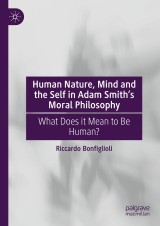Details

Human Nature, Mind and the Self in Adam Smith's Moral Philosophy
What Does it Mean to Be Human?|
117,69 € |
|
| Verlag: | Palgrave Macmillan |
| Format: | |
| Veröffentl.: | 24.04.2024 |
| ISBN/EAN: | 9783031567797 |
| Sprache: | englisch |
Dieses eBook enthält ein Wasserzeichen.
Beschreibungen
This book investigates the problematisation in Adam Smith's moral philosophy of a classical question: what makes us human beings from a moral standpoint? To do this, Riccardo Bonfiglioli explores the relationship between the concepts of ‘human nature’, ‘mind’ and ‘the self’ in order to reconstruct Smith’s theory of subjectivity. After providing a systematic reconstruction of Adam Smith’s conceptions of ‘human nature’ , ‘mind’ and ‘the self’ – exploring some aspects of Smith’s philosophy (nature, philosophy of history, sympathy and imagination) and their empirical expressions (education, conduct and character) – Bonfiglioli argues that, in Adam Smith’s work, the meaning of ‘moral human beings’ would depend on the human being’s effort to live in harmony with oneself and the others. According to Bonfiglioli, in Smith’s moral theory, this ‘harmony with oneself and the others’ would be achieved in relation to a certain kind of awareness that can be possible when human beings try to judge the conduct and try to act according to the impartial spectator. Specifically, this impartial spectator is reinterpreted by the author in the light of the concept of immediacy.
Part I. General Introduction.- Chapter 1. Research questions, aims and expected results.- 1.1. A philosophical problem: research questions and aims.- 1.2. Book structure and expected results.- Chapter 2. Methodological remarks.- 2.1. A methodology between reconstruction and interpretation.- 2.1.1. A focus on Adam Smith’s style.- 2.2. Adam Smith’s articulation of the concept of ‘human being’.- 2.3. Thematic contexts of Smith's elaboration of the concept of the human being.- 2.4. A moral glossary on Smith’s conception of human beings: merit, virtue and propriety.- Chapter 3. Adam Smith’s historical and biographical context.- 3.1. A sketch of Adam Smith’s historical framework.- 3.2. Biographical outline of Adam Smith.- Part II. Adam Smith On Nature And Human Nature.- Chapter 4. A semantic overview of ‘nature’ and ‘natural’ in Adam Smith’s moral philosophy.- 1.1. Nature, human nature and morality.- 1.2. Conclusion.- Chapter 5. A synthesis of Adam Smith’s conception of human nature.- 2.1. Introduction.- 2.2. Sources and theoretical contexts of Adam Smith’s moral conception of human nature.- 2.3. Sociability, the role of language and the human propensity to exchange.- 2.4. Human nature, harmony and society.- 2.5. Human nature and morality: Adam Smith’s conception of self-love.- 2.6. Harmony between oneself and the others in Adam Smith’s moral philosophy: the desire to better one’s condition and the desire to gain deserved approval.- 2.6.1. Some reflections on the role of happiness in Adam Smith’s moral philosophy.- 2.7. Conclusion.- Part III. The Origin And Development Of The Self In Adam Smith’s Moral Philosophy: History And Natural Self Correction.- Chapter 6. Philosophy of history, morality and human beings.- 1.1. Adam Smith’s philosophy of history: conjectural history and four-stage theory.- 1.1.1. History and human nature.- 1.2. Historical context and the self: Adam Smith’s conception of the savage.- 1.3. Conclusion.- Chapter 7. Natural self correction and human beings.- 2.1. Natural self correction and morality: infancy, sympathy and self-development.- 2.2. A focus on the psychological origin of the self.- 2.3. Conclusion.- Part IV. Adam Smith’s Model Of The Mind: Sympathy, Imagination, The Impartial Spectator And Immediacy.- Chapter 8. Perfect and imperfect sympathy in Adam Smith’s moral philosophy.- 1.1. Introduction.- 1.2. Passions in Adam Smith’s moral philosophy.- 1.2.1. The immediate dimension of passions.- 1.3. Natural and moral imagination.- 1.4. Perfect and imperfect sympathy.- 1.5. The terminological shades of sympathy.- 1.6. Conclusion.- Chapter 9. Immediacy as philosophical problem in Adam Smith’s moral theory.- 2.1. Introduction.- 2.2. Imagination, human nature and perception.- 2.2.1. Imagination, harmony and aesthetics.- 2.3. Pleasure and pain in Adam Smith’s moral philosophy.- 2.4. Harmony, imagination and the impartial spectator.- 2.5. Prudence, the impartial spectator and immediacy.- 2.6. The origin and expression of moraljudgment: the impartial spectator and immediacy.- 2.7. Conclusion.- Conclusions.
<b>Riccardo Bonfiglioli</b> is academic tutor and subject expert at the University of Bologna. He is associate member of the Walras-Pareto Centre (University of Lausanne), dynamic psychology researcher and MBSR instructor (Aim Milan).
This book investigates the problematisation in Adam Smith's moral philosophy of a classical question: what makes us human beings from a moral standpoint? To do this, Riccardo Bonfiglioli explores the relationship between the concepts of ‘human nature’, ‘mind’ and ‘the self’ in order to reconstruct Smith’s theory of subjectivity. After providing a systematic reconstruction of Adam Smith’s conceptions of ‘human nature’ , ‘mind’ and ‘the self’ – exploring some aspects of Smith’s philosophy (nature, philosophy of history, sympathy and imagination) and their empirical expressions (education, conduct and character) – Bonfiglioli argues that, in Adam Smith’s work, the meaning of ‘moral human beings’ would depend on the human being’s effort to live in harmony with oneself and the others. According to Bonfiglioli, in Smith’s moral theory, this ‘harmony with oneself and the others’ would be achieved in relation to a certain kind of awareness that can be possible when human beings try to judge the conduct and try to act according to the impartial spectator. Specifically, this impartial spectator is reinterpreted by the author in the light of the concept of immediacy.<div><br></div><div><b>Riccardo Bonfiglioli</b> is academic tutor and subject expert at the University of Bologna. He is associate member of the Walras-Pareto Centre (University of Lausanne), dynamic psychology researcher and MBSR instructor (Aim Milan).<br></div>
Provides tools for interpreting the relationship between ethics and economics Re-examines certain conceptual prejudices in relation to the way we think about human beings Systematises many of Smith's concepts in the light of the most recent literature


















